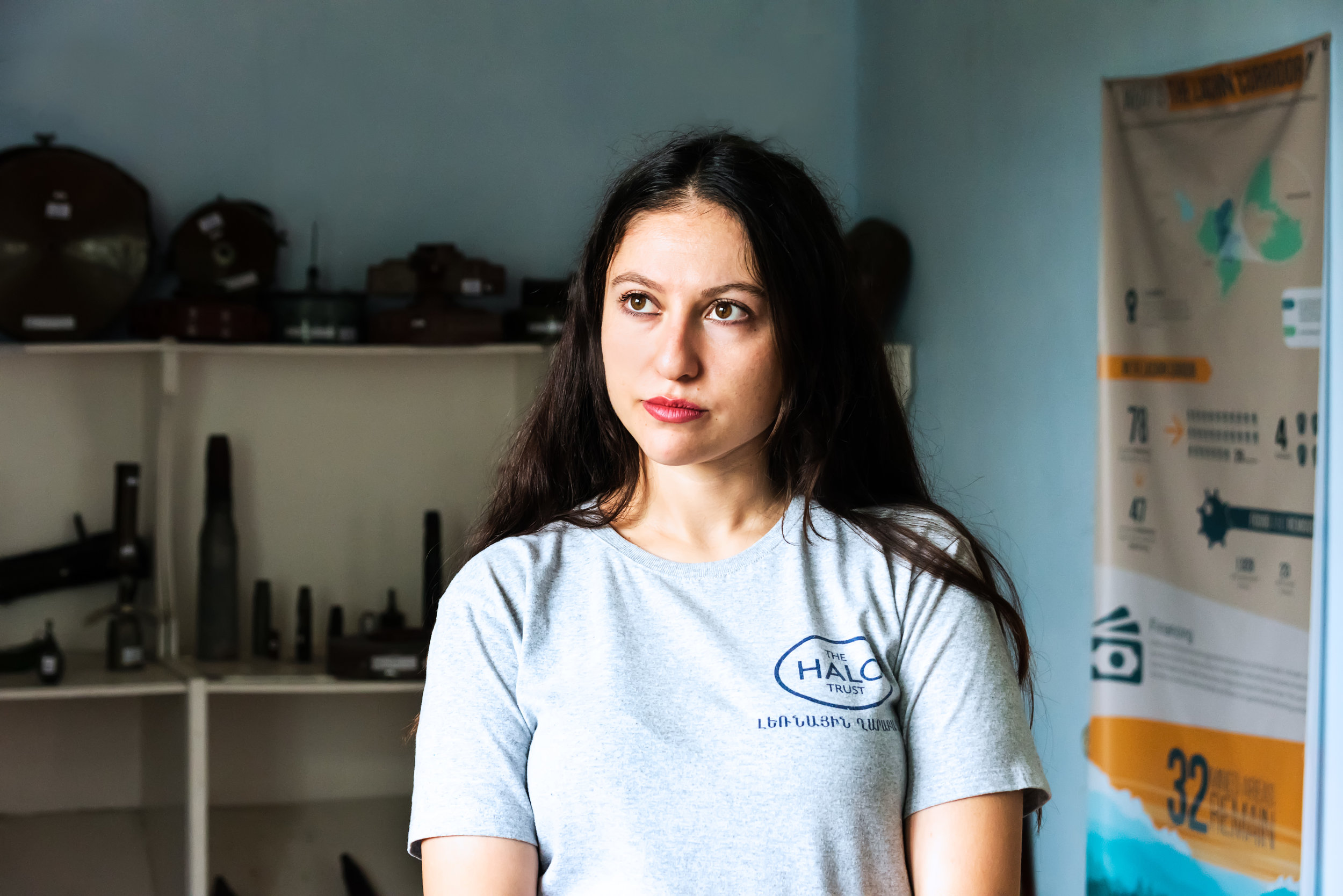
The New Freedom Fighters: Women and Nonviolent Resistance
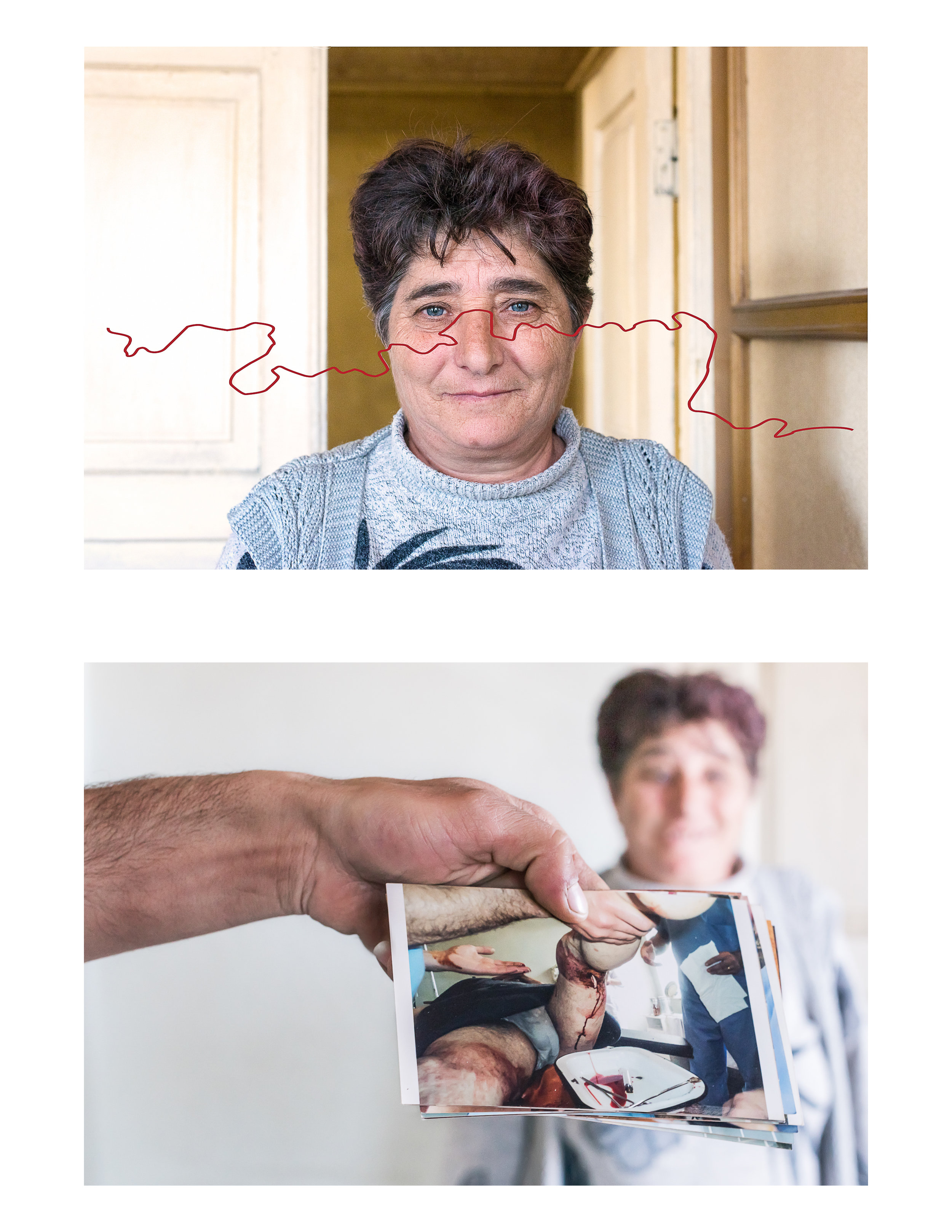
We Are The Real Border Guards
“They talk about soldiers, even walls, but we are the real border guards here,” says Knarik. “The chickens got out and my son was bringing them back in and suddenly they were firing on him. But our government forbids us to return their fire. There is no one who cares about us.”
The Geometry Of Our Spilled Blood
“Look at what they did to him. My father was working in the vineyards when their snipers shot him. He made a beautiful garden for us. It was our main source of income. But we can’t work in the garden anymore. Look at my father. Now he walks only with a cane.”
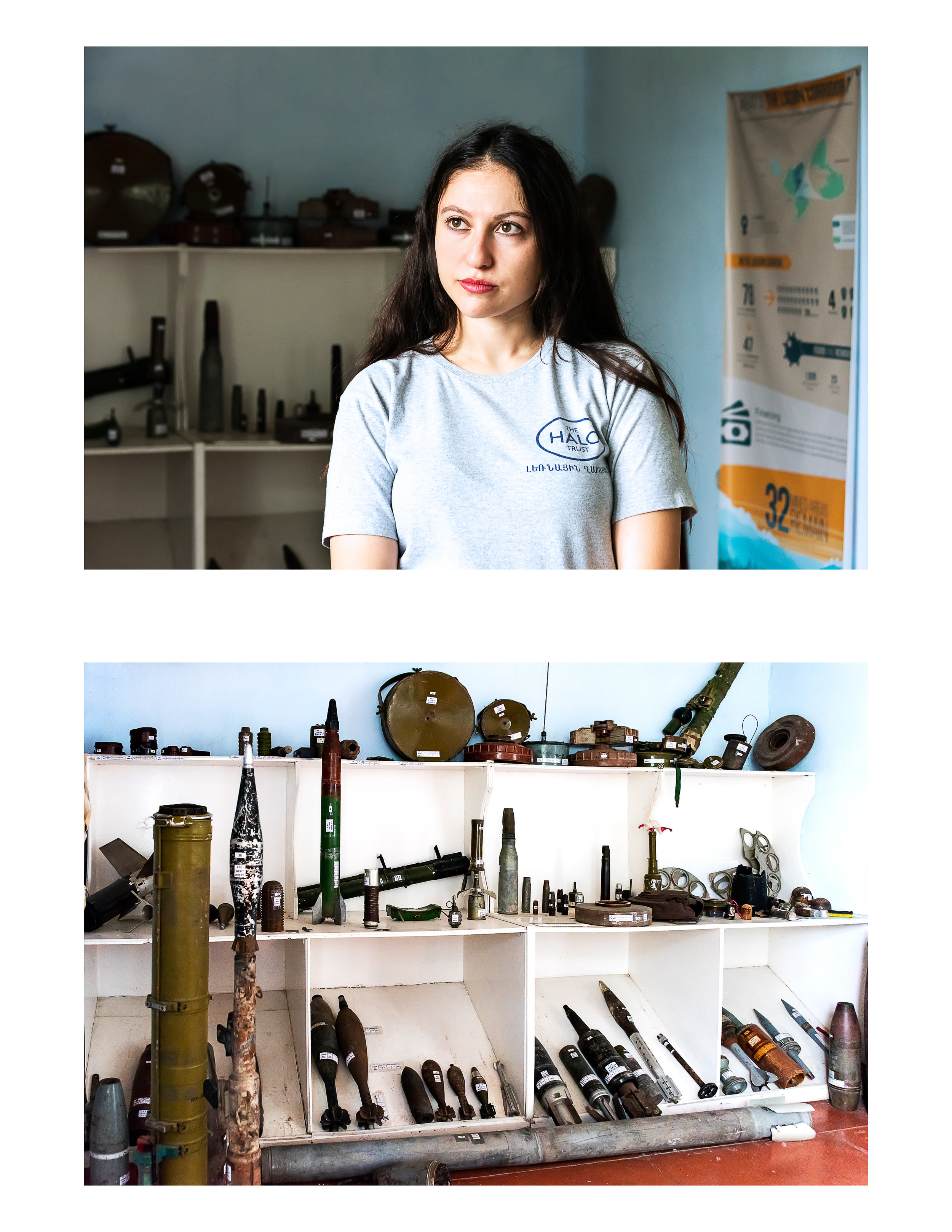
The Human Factor
“I am a deminer by training, working at the Halo Trust headquarters here in the Republic of Artsakh,” Anna explains, showing us the meticulous technique that her co-workers use to identify mines and lift them out of the ground. “The Halo Trust is not a political organization. The only thing that matters is the human factor. We want people on all sides to be safe, to do business, to live their lives.” Courageous, painstaking work by women like Anna furthers the humanitarian mission of the Halo Trust, turning lands poisoned by explosives into places where crops can grow, children can play and people can visit in conflict zones all over the world.
Wall Of Shame
The wall of samples of the unexploded ordnance they’ve collected here is staggering, but especially devastating is the land mine designed with a colorful ribbon attached. The brightly colored ribbon attracts small children who instinctively reach for it, only to be killed instantly as they pluck it from the ground.
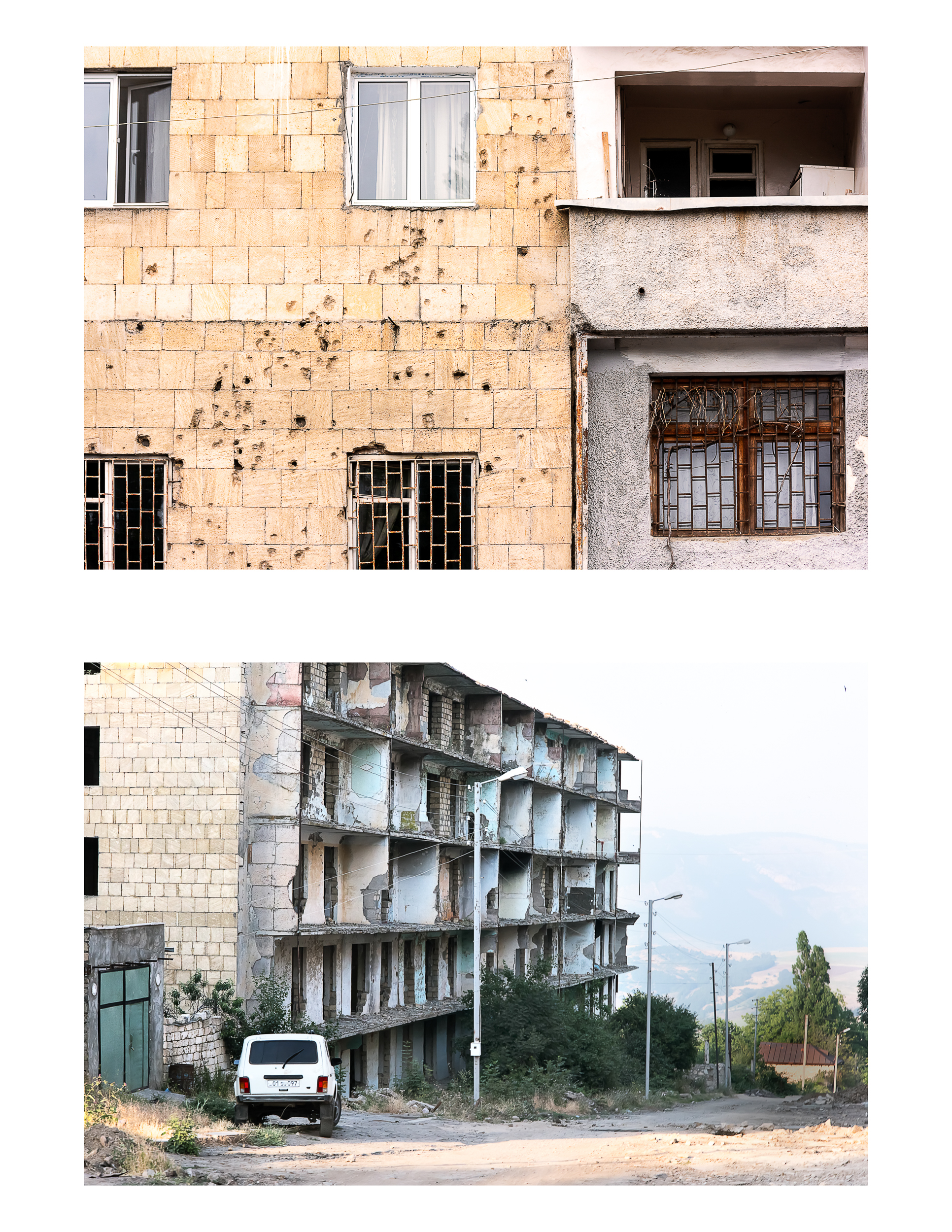
A Pattern Of Violence
Bullet holes form a tattoo on the front of this apartment building, marking it as a survivor of war.
Comes Home To War
In 2015, we watched as a woman got out of her car with shopping bags and disappeared into the ruined apartment building, another casualty of war.

Ine And Mariam
“One day they shot into the room where Ine was playing, and I watched in horror as her toy truck was blown up. Thank God she had just put it down, thank God it was not her.”
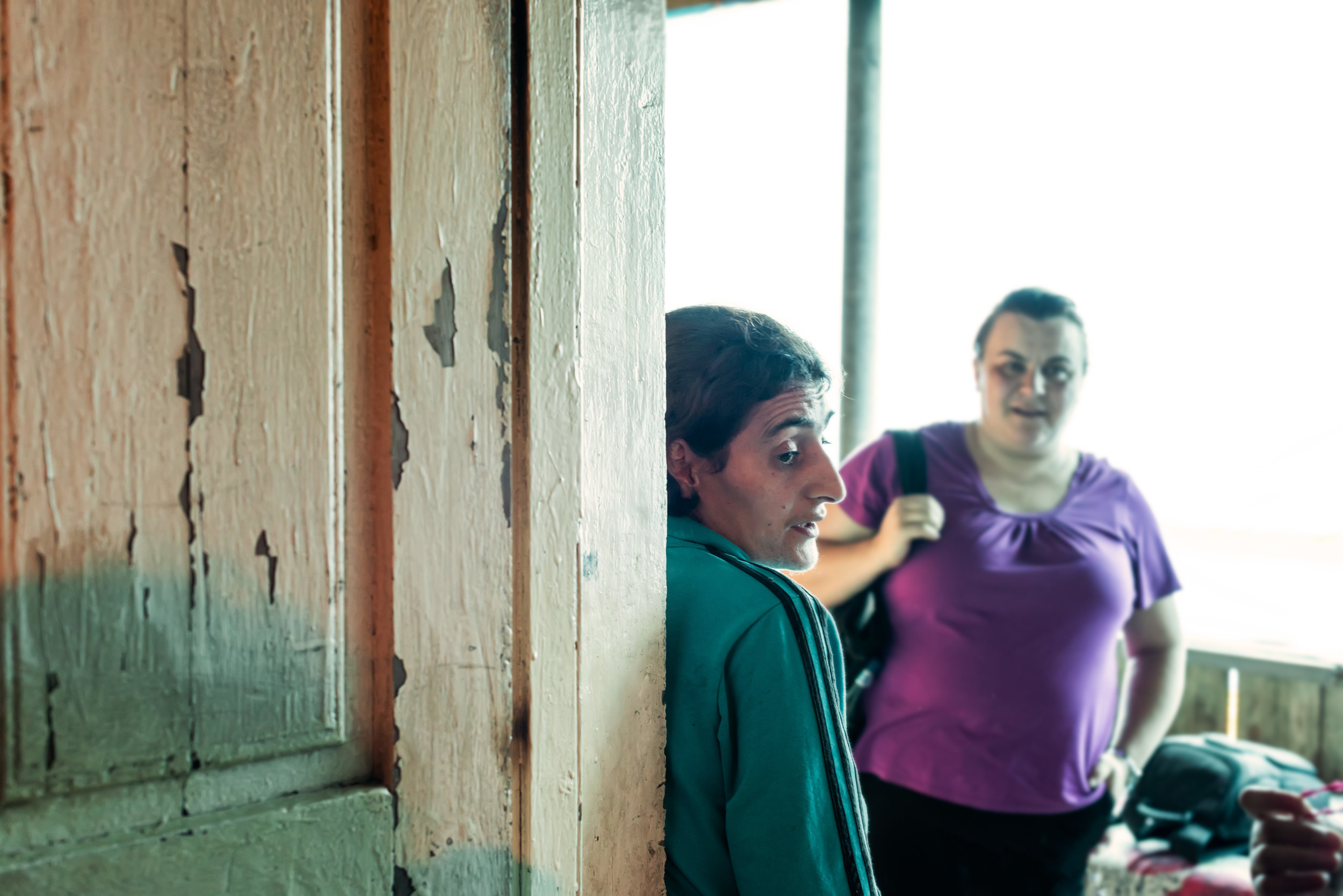
In A Bottomless Sea Of Debt
In the poverty that weighs on many families living in the shadows of war, Lena’s husband borrowed money from a family member. Unable to repay the loan, he committed suicide. As an unemployed single mother, Lena faces not only grief, but an enormous struggle to feed her girls. Her hope is resilient, however, and she still focuses on the education that may be their salvation.

In Front Of Us, The Border
“The border is right in front of our house,” Zhanna tells us “so we can hear the bombing from time to time.” What keeps them here? Have they gotten used to the sound of gunfire? “No, it’s still difficult,” she says “but we have nowhere else to go. I would like to move for the sake of my children. I would like them to have better things, like a cultural center where they could learn and experience more.”

Shelter
Three women from the border villages stand in a recently renovated bomb shelter, telling stories of life in an undeclared war. Two days before our arrival, Azerbaijan was firing on the tiny village less than half a mile from the border. “We sleep in shelters sometimes,” said one young woman. “One day my little sister was observing the fact that our enemy sleeps at night and wakes in the morning just like we do.” “We teach our kids to love their enemy,” added another. “Even though there is bombing, we want them to learn that it’s the government not the people who are behind the violence. Even with the shooting, classes don’t stop. In the capital Yerevan kids think about playing, but here the kids think about how to survive and help their families.”

Gone For A Soldier
Karine was one of the first female soldiers in her country. When she went to enlist in the war for independence, the recruiter told her to go home and bring them a son. “Is it only the boys homeland, not ours?” she argued. The recruiter told her that she would only be considered for duty if she could reassemble a Kalashnikov in just a minute. "He looked at me and I knew he was thinking there was no way a girl like me could do it. But when I did, he had to take me."
The second time Karine was wounded, she wasn't expected to survive. Her mother tells how poor the facilities were and how little hope they expressed for Karine. She demanded to stay and nurse her daughter, and when the staff couldn't get her to leave, they gave up. "She's my daughter and I wouldn't give up on her. I never left her and nursed her myself for many months until I knew she would live. The doctors couldn't believe it. But it was a mother's love for her child that made Karine fight and made her well again."
After Azerbaijan attacked in 2020, residents of Shushi, Artsakh like Karine and her mother, have been forced from their homes. They will not be allowed to return.

Kitchen Wisdom
The tiny kitchen in this village home is carefully organized for cooking and many other family activities. “We are used to a difficult life,” the mother tells us. “I do my best for my children, but it is not easy.” Stacked on a nearby table is the summer harvest of produce that she has gathered to preserve for winter meals.
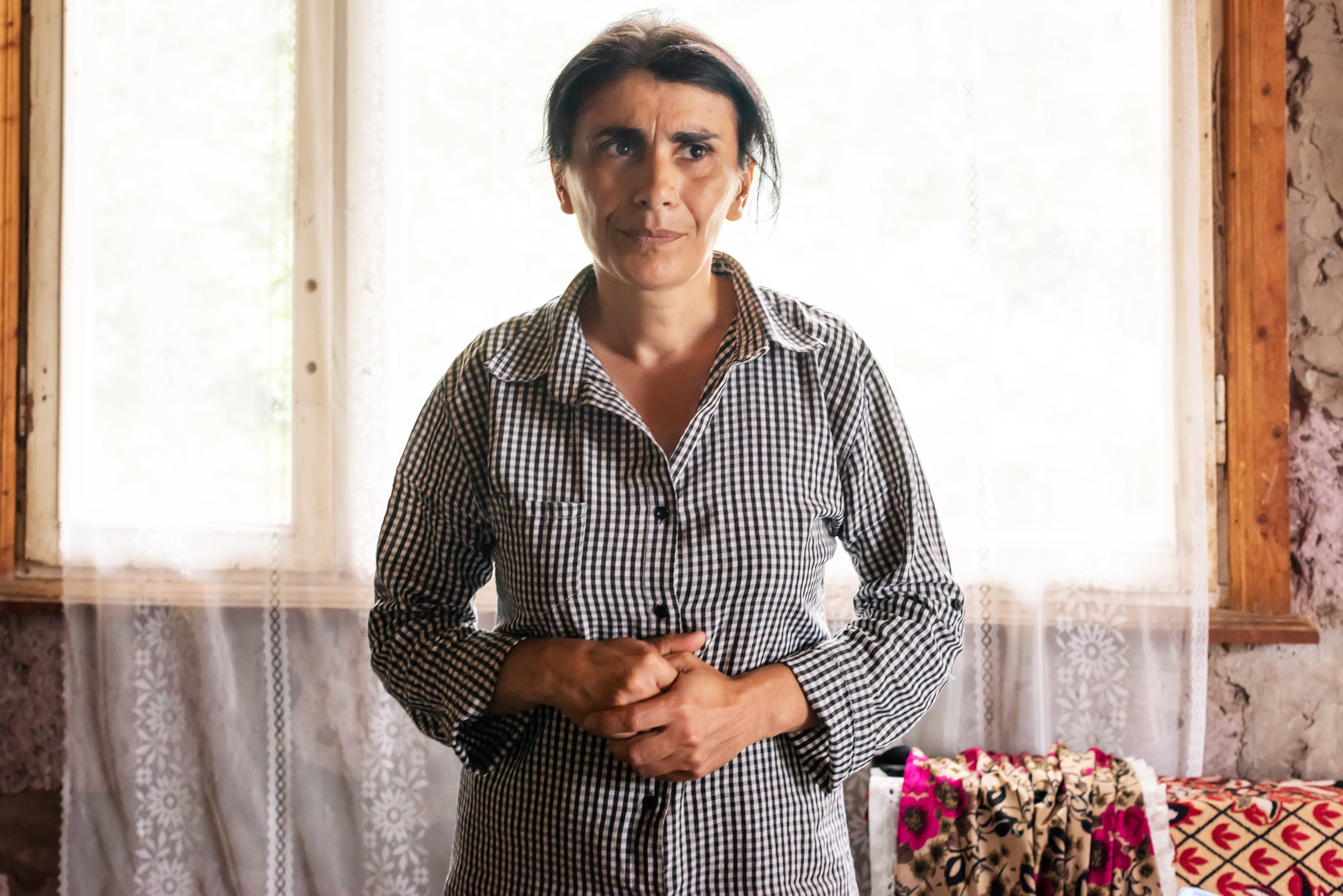
A Woman Of Substance
Ruzanna has built a small textile business, runs her family farm, and takes on the role of a single mother. Her husband is part of the thousands of men who must go to Russia as a migrant worker. His family see him for only a few days every year, when he comes home for New Years. Azerbaijan’s undeclared war on Armenia’s border weighs hard on them, holding this harsh economic reality in place. Ruzanna is a model of resourcefulness, but even so, the family faces considerable economic hardship to send their two daughters to university in Yerevan.

The Bounty Of Our Land
Sitting down to tea in the village is always an event, and a deep experience of Armenian hospitality. This family’s table was covered in the ripe fruits of the family farm and orchard, honey from their hives, fruits dried in the warm sun in the backyard, wine from their vineyards and pastries from their kitchen, all made by the talented women of one family. Families take great pride in their food and their ability to welcome strangers into their homes no matter the situation.
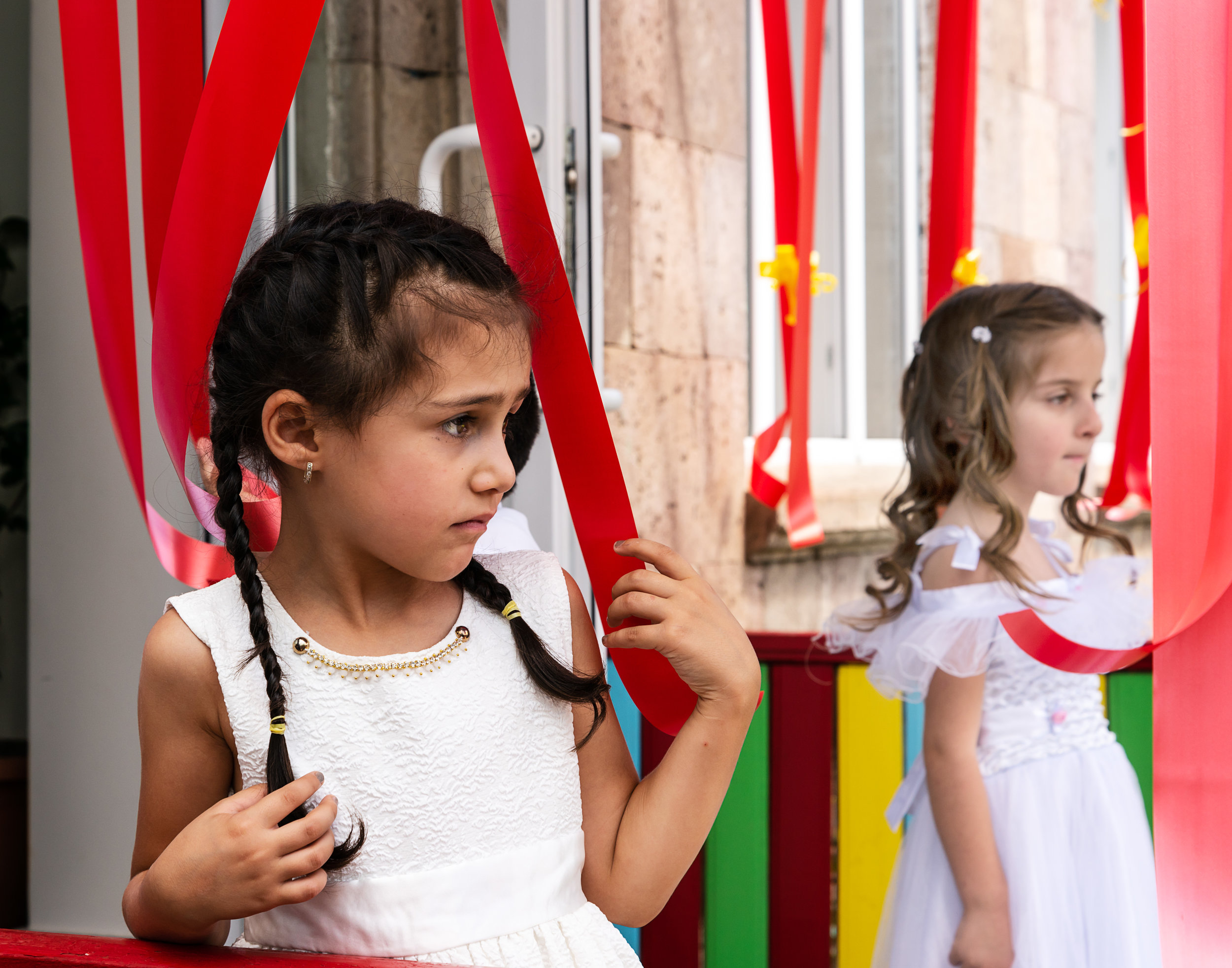
Waiting For The Celebration
The re-opening of the kindergarten celebrates a victory of nonviolent resistance. The no-man’s land has become a safe, comfortable, and productive space for education, providing hope and strength in a way that military action alone can never do. The patience of the children waiting on a hot day for the party to begin mirrors the patient hard work of the adults in the community as they work toward the future.
Beginning in July of 2020, Azerbaijan and Turkey joined in a campaign of terror against the civilian population of the border province of Tavush. They destroyed the rebuilt kindergarten, erasing all the work and money that went into the project. It is a huge loss for a poor country, and today they are already resolved to rebuild.

In The Humblest Home There Is Beauty
In the poorest homes, families often manage to keep one room full of things that are beautiful and meaningful to them, a calm haven despite the violence, fear, and destruction that invade other parts of their homes. This family has been painting a mural together to beautify the sitting room. They are gracious hosts, and their kindness infuses our visit with such happiness that when we’re invited to return, we don’t hesitate.
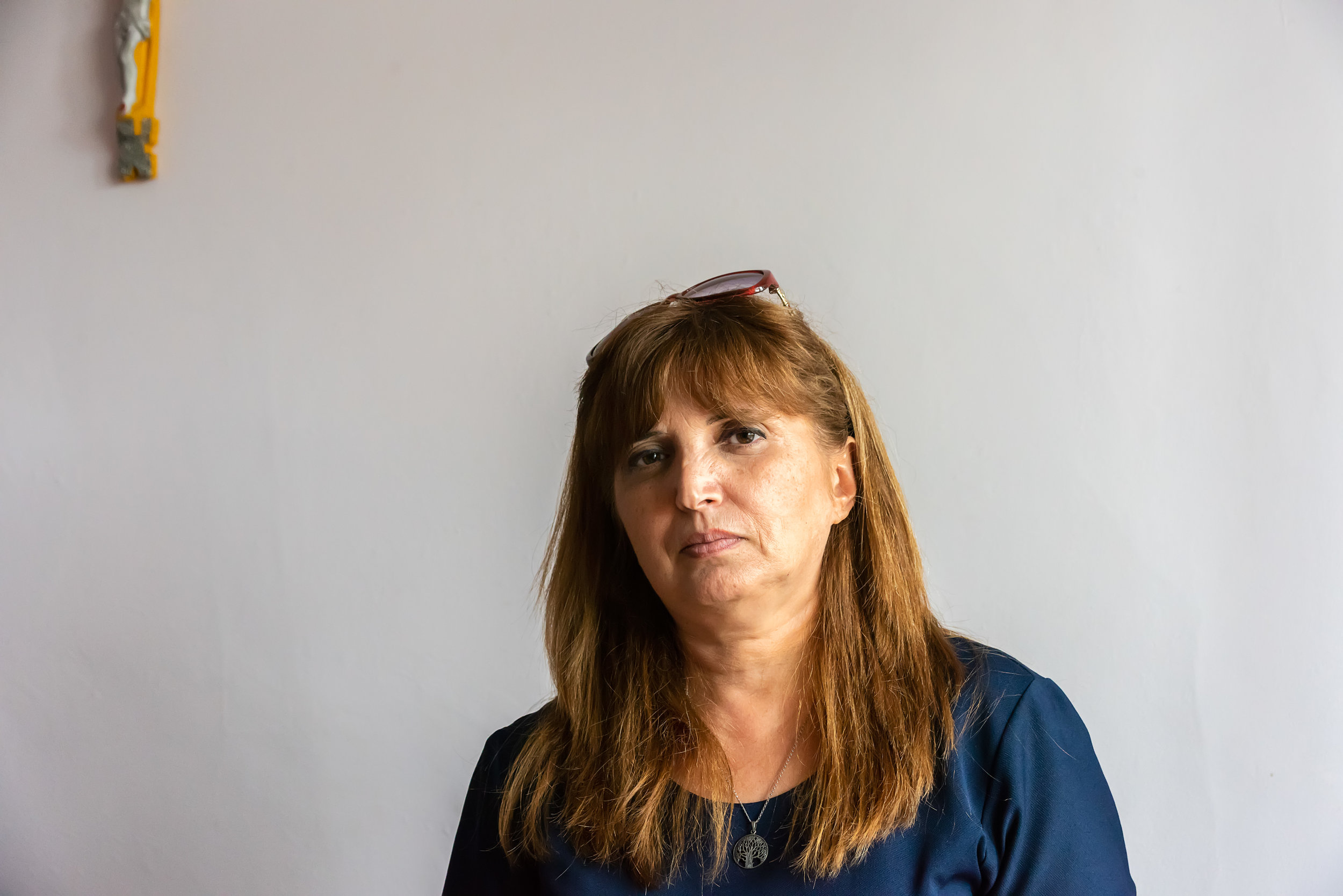
We’re Not Looking For Bread
Ruzanna heads a refugee organization that works with survivors of ethnic cleansing. She and her family barely survived the ethnic cleansing of Armenians in Sumgait, Azerbaijan in 1988. “We’re not looking for bread, we just want recognition and education,” says Ruzanna of the refugees she aids. “We loved Azerbaijan, it was our homeland.” The escalating violence made her a refugee, and the plight of fellow survivors made her an activist, and she became a leader in the early days of her country’s movement for independence. She has worked with a cross-border peace-building program, now shut down by the Azeri government. Ruzanna maintains contact with former classmates across the border, avoiding politics, and believing that kindness, caring and concern for each other is the way forward.
After Azerbaijan and Turkey’s war on Artsakh in 2020, Ruzanna is working with the thousands who are refugees, while dealing with her own trauma in the loss of her home and family members. “I’m dying every day, only to be resurrected and die again. You remember me as a strong woman, but I’m not anymore. They targeted our children and we had to defend ourselves. I’ve never wished anything bad for my neighbors in Azerbaijan. It was my motherland, but we weren’t wanted there, so we returned to my father’s homeland to live in peace. We are free people and don’t want to live as slaves. We want to live peacefully, and without hating our neighbors.”

Women’s Work
Collaboration between Armenia and its diaspora forms an essential part of the resistance. This agribusiness factory was started by one of the many Armenians pushed to Russia to find work. He has brought home the resources of his success there to start a business producing preserves, juices and other food products for export and employing a staff mainly composed of women from the border villages. The women we met were proud of their products and the interest in their work.
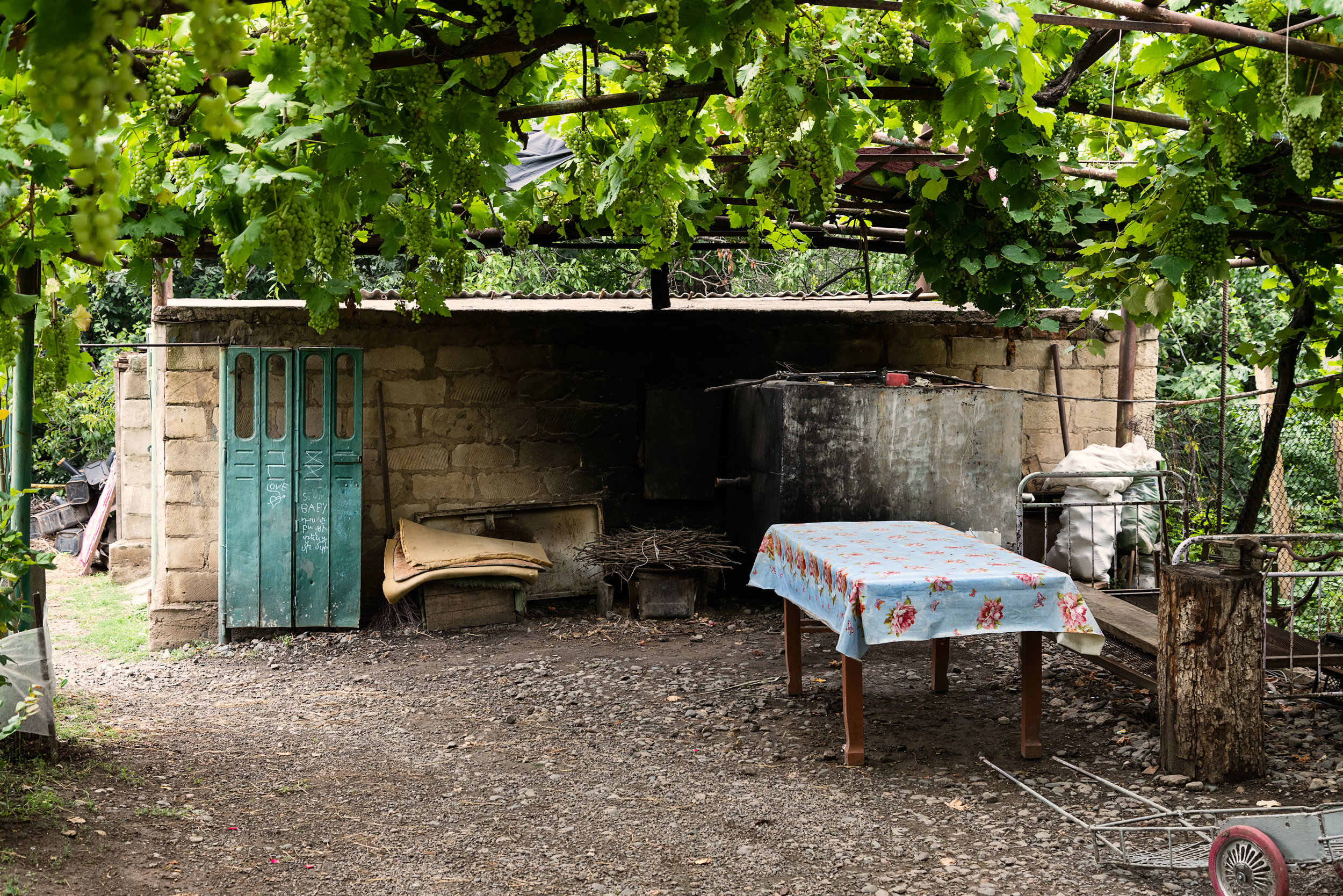
Our Backyard
In Armenian villages, women use the resources they can find and the natural environment to make beautiful living spaces. Families suffer from the poverty and violence, but they still love the land of their ancestors and treat it with care. Against an enemy that aims to push them out of their homes, creating comfortable spaces to live, work, and create, is an essential form of resistance.

Women Wage Peace
Lusine is a member of Women In Black, an international organization working towards a world without violence through activities that emphasize women’s roles in conflict resolution and peace building. Working with a group of Azeri women at a conference, she came to understand the history of the conflict and the obstacles to peace. Lusine explains that in Soviet times, when Stalin declared native Armenian land part of Azerbaijan, Armenians disregarded this since borders within the Soviet Union had no practical effect. But Azerbaijan wanted these lands for itself and war broke out in the Soviet Union’s collapse. In violation of the ceasefire agreement of 1994, Azerbaijan has continued a campaign of state-sponsored violence against the border villages of Armenia. Despite the efforts of the Azeri government to suppress women like Lusine and her Azeri counterparts, they continue their efforts at peace building at home and on the international stage.
During Azerbaijan’s war on Armenia in 2020, two activists who made mild anti war statements were detained for questioning, and no further such statements were reported. The war was a crushing blow to Armenian peace efforts. Activists like Lusine are now busy trying to help others recover from the war, especially the young people who represent the country’s future.
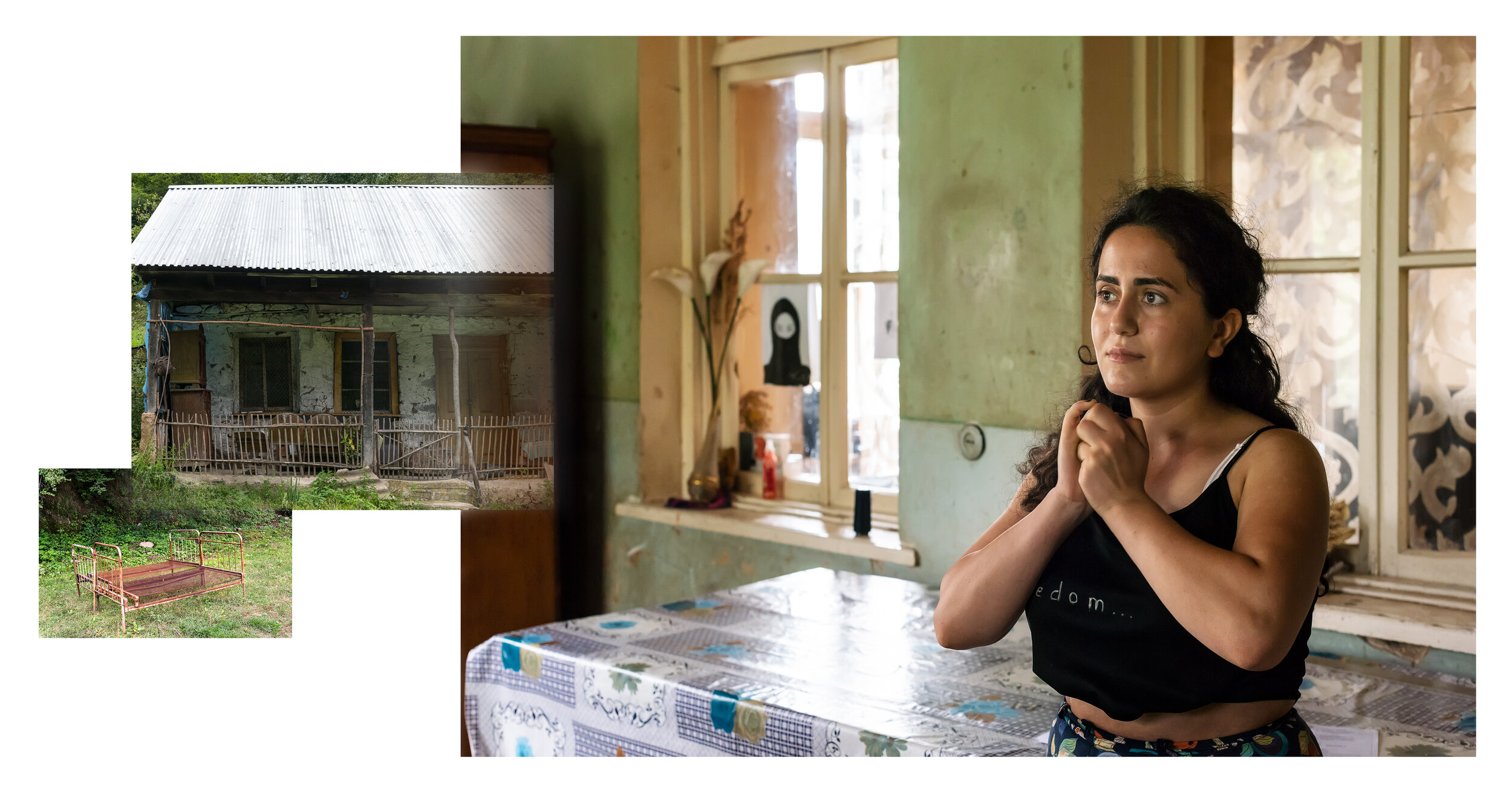
The Road Ahead
Astghik studies hospitality at university in Yerevan and dreams of introducing tourism to the parts of the border region not directly under fire. She sees potential in the mountains, forests, and undiscovered ruins of her hometown of Aygedzor, and has plans for the Berry House, a guesthouse where visitors can stay and learn about the environment and indigenous culture of the village. “The beauty of nature here is in my soul,” Astghik explains. “I want to help develop the tourism industry in Aygedzor, so that I can share the beauty and serenity of the nature here with visitors, and help bring jobs to my community.”
After being evacuated for a week because of the war, Astghik is still hopeful about developing tourism in her village, and continues to work towards that goal.

The New Freedom Fighters
“We love to work with people who love to work, not just people who are poor,” Anahit told us. Thus began a long day of surprise monitoring visits to project beneficiaries of her NGO. Anahit works as a project manager, but spends her days off traveling to villages, conducting investigations, working on strategy and planning with entrepreneurs, and evaluating creative ideas for new and existing businesses. “We don’t just hand people money,” she explained, “we provide equipment which belongs to us until the beneficiaries prove that they are running a successful business. If they don’t make a go of it, we take the equipment and work with another entrepreneur.” Women like Anahit are the new freedom fighters, fighting back against the violence with creative projects designed to bring a better future.
The war has created new problems, but women like Anahit are working harder than ever on development projects. “Without a strong economy, there can be no security.”

The Collective
These women believe in the power of creative resistance to bring about change. Their crochet collective in Berkaber is producing creative designs for stuffed animals, fulfilling orders from Armenia and abroad. Two of the members explain the new designs and marketing plans over coffee. In Berkaber, a village where residents can see their attackers from the village streets and even cafes are places of danger, these women’s creativity has given birth to new hope.

The Vintner
Our first stop on a future Tavush wine route, Mrs. Davityan welcomed us to her family winery. As we enjoyed one of her earthy red wines in the new tasting room, she explained her plans for the expansion of the winery using computer-generated models and building plans. They have already begun work on the guesthouse, and new winemaking equipment has arrived to enhance her process. In addition, she and her family are collaborating on innovations to enhance the guests’ experience, such as featuring performances of her children on their traditional Armenian instruments. “Winemaking is in our blood,” she says “our grandparents were making wine too.” If we raise a glass, we may not have to raise a gun.
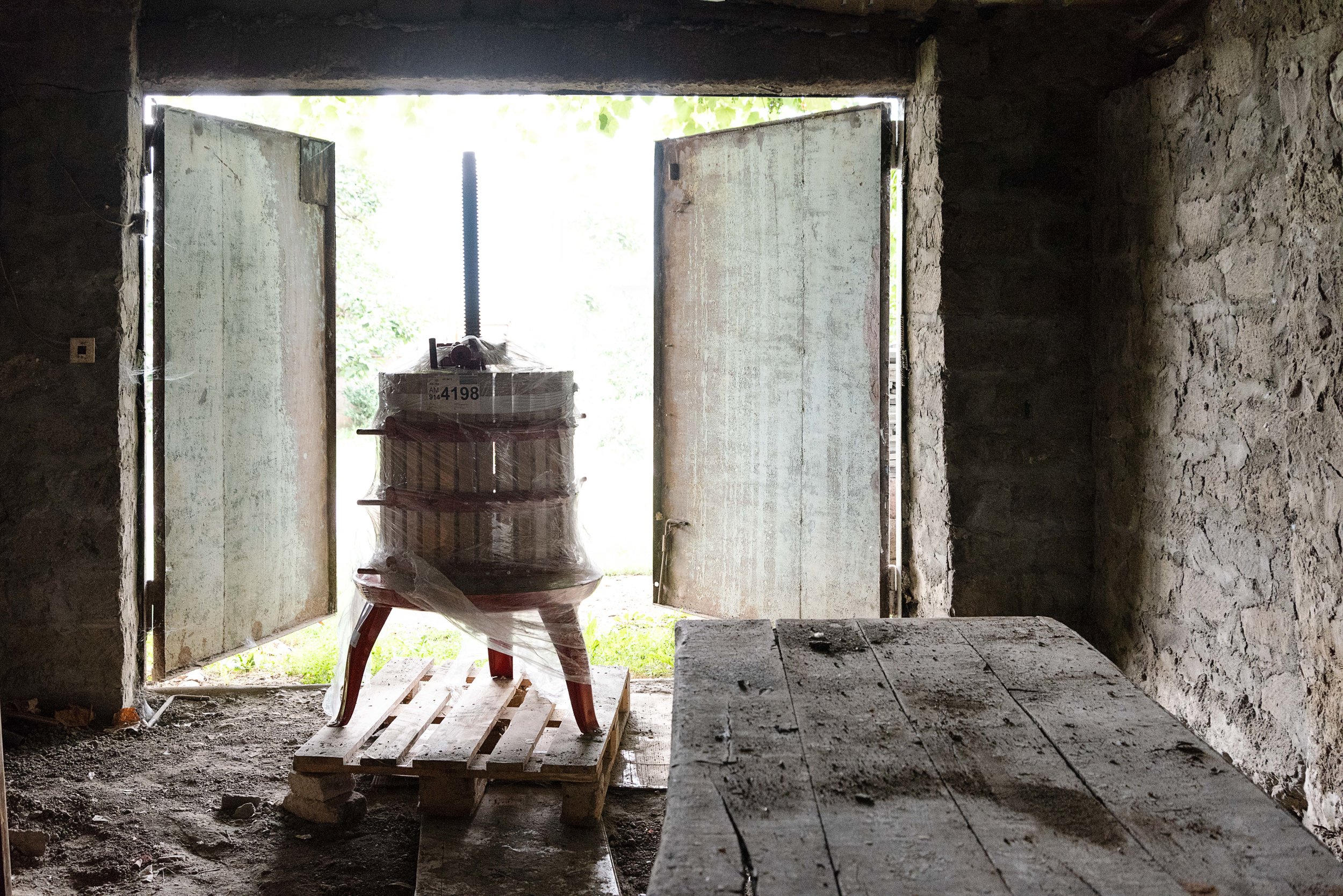
A Wondrous Machine
A local NGO dedicated to agribusiness and rural development has just delivered new equipment to this family winery. With a sense of wonder, the family shows us the new machine and explains the new techniques they’ve been studying, and how they will use the new equipment to improve their production Their excitement is contagious and soon we’re raising toasts to the brighter future ahead.

Her Head In The Cloud
“All the students in my math class are women, and so are the chief of my IT center, the minister of education, the head of the state university,” Lilit explains. She is in her last year at university, has started a growing web design company, and teaches technology skills to local children through three different programs. “There are many women in tech fields in my country, and I believe tech will push us forward.” Women like Lilit are also training the next generation of STEM students at technology learning centers that draw children to discover the power of technology, shifting their attention from the difficulties of life under threat of war to the creative possibilities of their own minds.
The optimism and progress of women like Lillit were destroyed in 2020, when Azerbaijan invaded Artsakh ethnically cleansing much of the population.

Art As Resistance
In a small village in a war-weary country, people understand the value of art to bring about change. The Togh Village Art School is a miracle in a country of 160,000 souls, perpetually forced to defend themselves against the ceasefire violations of their wealthier neighbor, a country of 9 million. With painting, weaving, sculpture, photography, music and dance studios, as well as its own orchards, vineyards and bee hives, the school stands on the edge of nowhere, a testament to the will of the people to meet violence with creativity that fuels the souls of future generations.
Landscape With Tank
What do you do with the shell of a tank? In a tiny country with no resources for scrap metal recycling, it stands as a monument to the people’s defense of their human rights when forced to take up arms. In front of the local school, children pass it on their way to class, heading to the school beehives, or taking a moment to look over the wide valley that stretches out in front of the hill. It becomes a part of their landscape, reminding them that struggle and the power of their nonviolent resistance are essential to the land they live on.
Togh Village, with its many Armenian historic and cultural sites, was invaded and occupied by Azerbaijan in 2020.

The Rights Of Woman
Mother and daughter, Gayane and Liza, work together towards peace, believing that women will lead the way. “We work to empower women, here women share information with other women, and we have trainings about legal rights and peacebuilding,” the women of the Women’s Resource Center in Shushi explain. “We want to develop a peace culture, learning to diffuse violence at all levels, within ourselves, between people, between groups, between states,” they say, explaining their mission. The atmosphere in the Center is calm and welcoming, a safe haven for women and children who need support. Here you can feel the power of nonviolent resistance and the determination of the women to use this power to overcome obstacles and build a better future.
In this photo, the Gayane and Liza gaze out on the historic city of Shushi, Artsakh, now occupied by Russian and Azeri troops, putting an end to the work of the women there. After the ethnic cleansing of Shushi, both women became refugees in Yerevan, the capital of Armenia. They are working with refugees in Armenia and in Stepanakert, the capital of Artsakh. They told me that a decade of work building a peace culture was erased by forty-four days of war.
